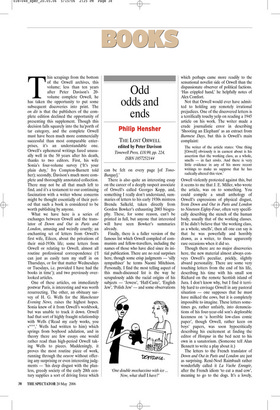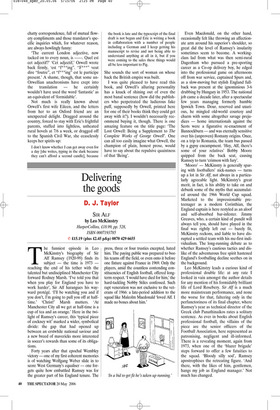Odd odds and ends
Philip Hensher
THE LOST ORWELL edited by Peter Davison Timewell Press, £18.99, pp. 224, ISBN 1857252144 Thin scrapings from the bottom of the Orwell archives, this volume; less than ten years after Peter Davison’s 20volume complete Orwell, he has taken the opportunity to put some subsequent discoveries into print. The on dit is that the publishers of the complete edition declined the opportunity of presenting this supplement. Though this decision falls squarely into the ha’porth of tar category, and the complete Orwell must have been much more commercially successful than most comparable enterprises, it’s an understandable one. Orwell’s ephemeral writings fared unusually well in the 50 years after his death, thanks to two editors. First, his wife Sonia’s four-volume survey (‘It’s your plain duty,’ Ivy Compton-Burnett told her); secondly, Davison’s much more complete and thoroughly annotated collection. There may not be all that much left to find, and it’s a testament to our continuing fascination with a writer whose concerns might be thought essentially of their period that such a book is considered to be worth publishing by anyone.
What we have here is a series of exchanges between Orwell and the translator of Down and Out in Paris and London, amusing and weirdly courtly; an enchanting set of letters from Orwell’s first wife, Eileen, about the privations of their mid-1930s life; some letters from Orwell or relating to Orwell, almost all routine professional correspondence (‘I can just as easily turn my stuff in on Thursdays, or for that matter Wednesdays or Tuesdays, i.e. provided I have had the books in time’); and two previously overlooked articles.
One of these articles, on immediately postwar Paris, is interesting and was worth resurrecting. The other, an obituary survey of H. G. Wells for the Manchester Evening News, raises the highest hopes. Sonia knew of it from Orwell’s workbook, but was unable to track it down. Orwell had that sort of highly fraught relationship with Wells (‘Read my early works, you s***,’ Wells had written to him) which springs from boyhood adulation, and in theory there are few essays one would rather read than high-period Orwell taking Wells to pieces. Maddeningly, it proves the most routine piece of work, running through the oeuvre without offering any surprising or even interesting judgments — ‘his deep disgust with the planless, greedy society of the early 20th century supplies a sort of driving force which can be felt on every page [of TonoBungay].’ There is also quite an interesting essay on the career of a deeply suspect associate of Orwell’s called Georges Kopp, and, something I really don’t understand, summaries of letters to his early 1930s mistress Brenda Salkeld, taken directly from Gordon Bowker’s exhausting 2003 biography. These, for some reason, can’t be printed in full, but anyone that interested will have seen Bowker’s summaries already.
Finally, there is a fuller version of the famous list which Orwell compiled of communists and fellow-travellers, including the names of those who have died since its initial publication. There are no real surprises here, though some crisp judgments — ‘silly sympathiser’ he terms Naomi Mitchison. Personally, I find the most telling aspect of this much-discussed list is the way he scrupulously adds the racial origins of his subjects — ‘Jewess’, ‘Half-Caste’, ‘English Jew’, ‘Polish Jew’ — and some observations which perhaps came more readily to the sensational novelist side of Orwell than the dispassionate observer of political factions. ‘Has crippled hand,’ he helpfully notes of Alex Comfort.
Not that Orwell would ever have admitted to holding any remotely irrational prejudices. One of the discovered letters is a terrifically touchy yelp on reading a 1945 article on his work. The writer made a crude journalistic error in describing ‘Shooting an Elephant’ as an extract from Burmese Days, but this is Orwell’s main complaint: The writer of the article states: ‘One thing [Orwell] obviously is in earnest about is his assertion that the working class, as a whole, smells — in fact stinks. And there is very little evidence in any of his more recent writings to make us suppose that he has radically altered this view.’ Orwell violently protested against this, but it seems to me that J. E. Miller, who wrote the article, was on to something. You could compile a small anthology of Orwell’s expressions of physical disgust, from Down and Out in Paris and London to Nineteen Eighty-Four, often very specifically describing the stench of the human body, usually that of the working classes. If he didn’t believe that ‘the working class, as a whole, smells’, then all one can say is that he was powerfully and horribly drawn, as a writer, to those apparently rare occasions when it did so.
Though there are no major discoveries here, the new material almost always conveys Orwell’s peculiar, prickly, slightly absurd personality. There are some very touching letters from the end of his life, describing his time with his small son Richard on the remote Scottish island of Jura. I don’t know why, but I find it terribly hard to envisage Orwell in any pastoral situation — one supposes that he must have milked the cows, but it is completely impossible to imagine. These letters sometimes go, rather unfairly, into denunciations of his four-year-old son’s deplorable keenness on ‘a horrible low-class comic paper’, though Orwell, rather keen on boys’ papers, was soon hypocritically describing his excitement at finding the editor of Hotspur in the bed next to his own in a sanatorium. (Someone tell Alan Bennett to write a play about it.) The letters to the French translator of Down and Out in Paris and London are just as surprising. René-Noel Raimbault rather wonderfully called it La Yache Enragée, after the French idiom ‘to eat a mad cow’, meaning to go to the dogs. It’s a lovely, chatty correspondence, full of mutual flowery compliments and those translator’s specific inquiries which, for whatever reason, are always howlingly funny: ‘The current London adjective, now tacked on to every noun, is . Quel est cet adjectif?’ ‘Cet adjectif,’ Orwell wrote back firmly, ‘est “f***ing”. “F***” veut dire “foutre”, et “f***ing” est le participe present.’ A shame, though, that some unOrwellian anachronisms have crept into the translation — he certainly wouldn’t have used the word ‘fantastic’ as an equivalent of ‘formidable’.
Not much is really known about Orwell’s first wife Eileen, and the letters from her to an Oxford friend are an unexpected delight. Dragged around the country, forced to stay with Eric’s frightful parents, stuffed into lightless, unheated rural hovels at 7/6 a week, or dragged off to the Spanish Civil War, she ceaselessly keeps her spirits up:
I don’t know whether I can get away even for a day [she writes, typing in the dark because they can’t afford a second candle], because the book is late and the typescript of the final draft is not begun and Eric is writing a book in collaboration with a number of people including a German and I keep getting his manuscript to revise and not being able to understand anything at all in it, but if you were coming to the sales these things would all be less important to Pig.
She sounds the sort of woman on whose back the British empire was built.
I was quite pleased to have read this book, and Orwell’s alluring personality has a knack of shining out of even the most banal sentence (how did the publishers who perpetrated the ludicrous fake puff, supposedly by Orwell, printed here for one of their books think they could get away with it?). I wouldn’t necessarily recommend buying it, though. There is one amazing feature on the title page: ‘The Lost Orwell: Being a Supplement to The Complete Works of George Orwell’. One can all too easily imagine what Orwell, the champion of plain, honest prose, would have to say about the repulsive quaintness of that ‘Being’. Even Macdonald, on the other hand, occasionally felt like throwing an affectionate arm around his superior’s shoulder, so great did the level of Ramsey’s insularity sometimes seem to become. A workingclass lad from what was then semi-rural Dagenham who pursued a pre-sporting career as a Co-op delivery boy, he edged into the professional game on afternoons off from war service, captained Spurs and, as a slow-moving but stylish England fullback was present at the ignominious 3-6 drubbing by Hungary in 1953. The national job came a decade later, after a spectacular few years managing formerly humble Ipswich Town. Dour, reserved and uxurious, he mingled old-world courtesy and charm with some altogether savage prejudices — home internationals against the Scots were a figurative re-enactment of Bannockburn — and was eternally sensitive over his (unproven) Romany origins. Once, on a trip to Romania, the team bus passed by a gypsy encampment. ‘Hey, Alf, there’s some of your relatives’ Bobby Moore quipped from the back seat, causing Ramsey to turn ‘crimson with fury’.
‘Mooro’ — McKinstry is generally sparing with footballers’ nick-names — turns up a lot in Sir Alf, not always in a particularly agreeable light. McKinstry’s great merit, in fact, is his ability to take on and debunk some of the myths that accumulated around the 1966 World Cup squad. Marketed to the impressionable preteenager as a modern Corinthian, the England captain is here restyled as an aloof and self-absorbed bar-infester. Jimmy Greaves, who, a certain kind of pundit will always tell you, should have played in the final was rightly left out — barely fit, McKinstry reckons, and liable to have disrupted a settled team with his me-first individualism. The long-running debate as to whether Ramsey’s cautious tactics and dislike of the adventurous free spirit hastened England’s footballing decline seethes on in the background.
Leo McKinstry leads a curious kind of professional double life: at any rate I looked in vain amongst the author details for any mention of his formidably brilliant life of Lord Rosebery. Sir Alf is a much more mainstream performance, and none the worse for that, faltering only in the perfunctoriness of its final chapter, where Ramsey’s year as technical director of the Greek club Panathinaikos rates a solitary sentence. As ever in books about English professional football, the villains of the piece are the senior officers of the Football Association, here represented as patronising, negligent and ill-informed. There is a revealing moment, again from 1973, when one of the ‘blazer brigade’ steps forward to offer a few fatuities to the squad. ‘Bloody silly sod’, Ramsey apostrophises the retreating figure. ‘And there, with the likes of him, gentlemen, hangs my job as England manager.’ Not much has changed.



















































































 Previous page
Previous page